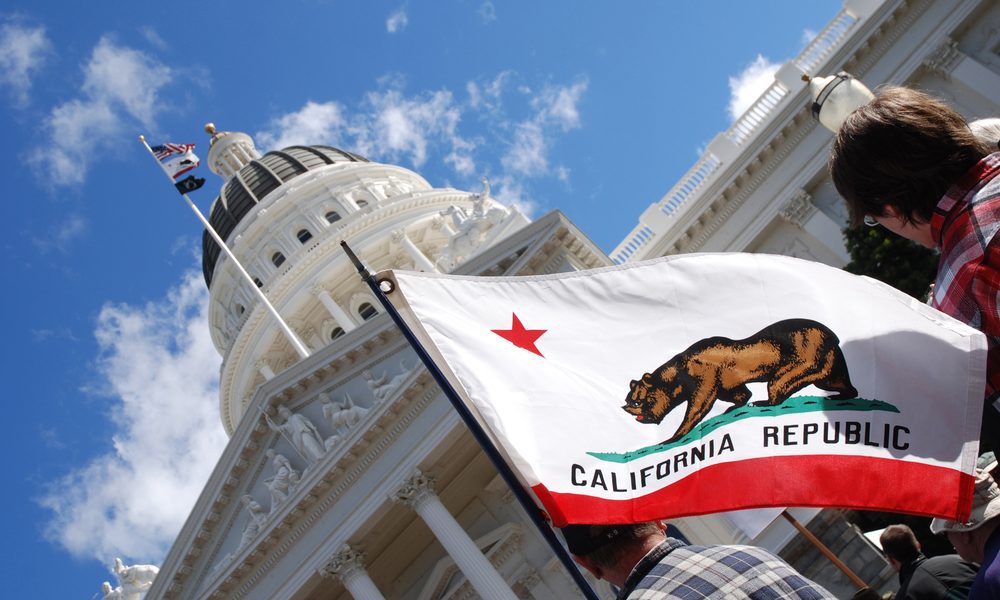Members of Kletsel Dehe Wintun Nation, the Sherwood Valley Rancheria of Pomo Indians, the Mechoopda Indian Tribe of Chico Rancheria, and Big Lagoon Rancheria gathered outside the Capitol in Sacramento on Monday to protest a bill backed by the California Nations Indian Gaming Association targeting sweepstakes operators.
If passed, Assembly Bill 831 would limit economic opportunities available to less wealthy California tribes by banning legitimate online social games that use sweepstakes promotions, the four tribes said. It would also eliminate more than $1 billion of existing economic activity generated by the industry in California and close off a potential new revenue source via regulation and taxation.
“AB 831 is a flawed and rushed bill that lacks broad tribal consensus. As Kletsel Dehe Wintun Nation, the Sherwood Valley Rancheria of Pomo Indians, the Mechoopda Indian Tribe of Chico Rancheria, and Big Lagoon Rancheria have made clear, this bill would limit economic options available to tribes and worsen already fragile economic conditions,” said Jeff Duncan, executive director of the Social Gaming Leadership Alliance and former member of Congress.
“Instead, California lawmakers should focus on creating proper regulation that supports online social games, creates new revenue sources for the state, and protects economic opportunities for all tribes.”
Those four tribes’ opposition was raised in a webinar in late August by the California Nations Indian Gaming Association Chair James Siva and Indian Gaming Association Conference Chair Victor Rocha, who accused the sweepstakes industry of trying to divide tribes. Sweepstakes is a form of online gaming they say is illegal and violates tribal sovereignty.
Siva and Rocha said the bill aims at dismantling the sweepstakes industry and holding accountable the entire ecosystem, from operators and payment processors to celebrity endorsers.
“This is the classic divide-and-conquer tactic. These companies try to pick off some of the small non-gaming tribes and make them outlandish promises,” Siva said. “What it comes down to in the end is asking them to sell a little of their sovereignty.
“I don’t blame them for making tough decisions for the betterment of their people,” Siva said. “Some of the tribes that announce these partnerships still struggle to provide basic resources for their members. It’s a shame that tribal brothers and sisters in this state are living in those conditions today. At the same time, collectively, we’ve done so much to improve the lives of every single tribal person in California.”
The four tribes are located in more geographically isolated areas and often lack the scale and resources of wealthy, established, gaming tribes. The policies proposed in AB 831 would eliminate digital-commerce opportunities that could provide supplemental revenue streams to fund essential services, such as healthcare, education, housing, food security and social programs, they said.
They also argued that AB 831 contains broad criminalization language that would impose criminal penalties on those who “support directly or indirectly the operation, conduct, or promotion of an online sweepstakes game.” As written, AB 831 also applies to tribal nations.
Extending state criminal jurisdiction into Indian Country violates federal law and is an encroachment on tribal sovereignty, they argue.
“For communities long overlooked and geographically isolated, digital commerce is not a luxury, it’s a lifeline,” said Eric Wright, tribal administrator of Kletsel Dehe Wintun Nation and CEO of Kletsel Economic Development Authority, the tribe’s economic-development arm. “AB 831 would sever that lifeline. Tribal members gather at the Capitol today to ask lawmakers to stand for tribal equity, sovereignty, and economic justice by voting NO on AB 831.”
Buffey Bourassa, secretary of the Sherwood Valley Rancheria of Pomo Indians, added that they were proud to join with other tribes at the Capitol in Sacramento to tell lawmakers that eliminating legitimate, regulated, digital enterprise will only deepen the disparities their people face, erode tribal self-sufficiency, and contradict California’s stated commitment to equity and inclusion for all tribal nations.
“We call on California legislators to reject AB 831 and instead advance inclusive policies that support digital innovation, economic diversification, and tribal self-determination,” Bourassa said. “The future of our communities depends on it.”
The bill has moved forward without meaningful consultation with tribes and it threatens to even further entrench a two-tiered system that benefits wealthy gaming tribes while marginalizing more rural nations, said Dennis Ramirez, chair of the Mechoopda Indian Tribe of Chico Rancheria. “We urge California lawmakers to reject AB 831 and stand firmly for tribal sovereignty, equity, and economic justice.”




